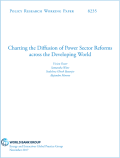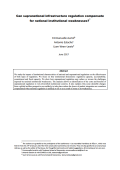
Some 25 years have elapsed since international financial institutions espoused a package of power sector reform measures that became known as the Washington Consensus. This package encompassed the establishment of autonomous regulatory entities, the vertical and horizontal unbundling of integrated national monopoly utilities, private sector participation in generation and distribution, and eventually the introduction of competition into power generation and even retail services. Exploiting a unique new data set on the timing and scope of power sector reforms adopted by 88 countries across the developing world over 25 years, this paper seeks to improve understanding of the uptake, diffusion, packaging, and sequencing of power sector reforms, and the extent to which they were affected by the economic and political characteristics of the countries concerned. The analysis focuses on describing the patterns of reform without judging their desirability or evaluating their impact. The paper finds that following rapid diffusion during 1995–2005, the spread of power sector reforms slowed significantly in 2005–15.

Nature-based solutions simultaneously provide environmental, social and economic benefits by bringing more nature and natural features and processes into cities, landscapes and seascapes. The Horizon 2020 Expert Group on ‘Nature-Based Solutions and Re-Naturing Cities’ was established under the 2014 Work Programme for the Societal Challenge “Climate action, environment, resource efficiency and raw materials”. For this report, renowned experts engaged in forward-looking reflection on future orientations for EU Research and Innovation for Nature-Based Solutions and Re-Naturing Cities.
An EU Research & Innovation (R&I) agenda on nature-based solutions will enable Europe to become a world leader both in R&I and in the growing market for nature-based solutions. For this, the evidence base for the effectiveness of nature-based solutions needs to be developed and then used to implement solutions.

The authors study the impact of institutional characteristics of national and supranational regulation on the effectiveness of both types of regulation. The focus is on four institutional dimensions: regulatory capacity, accountability, commitment and fiscal capacity. It is shown how supranational regulation may reduce or worsen the challenges imposed by national institutional weaknesses. The analysis allows an identification of the costs and benefits of supranational regulation in very diversified institutional contexts. It also explains why some desirable changes from a global welfare perspective are unlikely to take place unless the losers of market integration are somehow compensated when national regulation is unlikely to do so as a result of some of its weaknesses.


